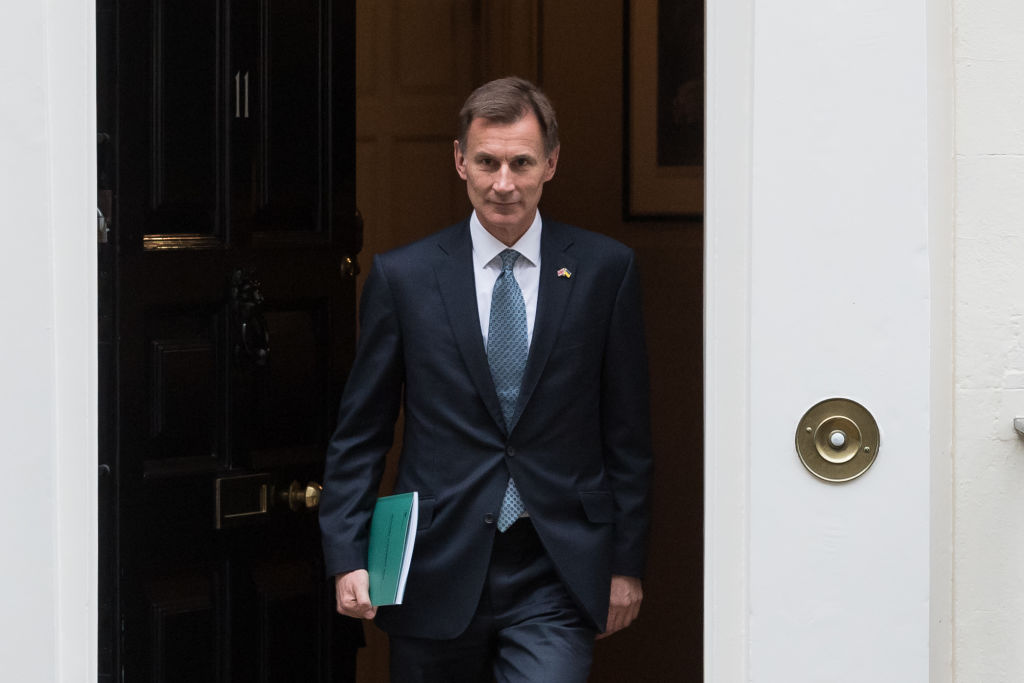A Chancellor’s Sunday media appearance before a Budget often serves as a ‘free pass’ – not because difficult questions aren’t asked, but because they can quite easily get out of answering by saying some polite version of: ‘you’ll have to wait and see.’ So instead of focusing on the upcoming Budget this Wednesday, the BBC’s Laura Kuenssberg decided to ask Jeremy Hunt this morning about his party’s long-term record. Those questions he had to answer. It wasn’t an easy task.
Kuenssberg presented Hunt with two tricky metrics: housing prices and average wages. The former, Kuenssberg notes, has skyrocketed, while average wages are failing to keep up with inflation. Many people (especially young people) she noted, will be feeling worse off. Hunt came back with a fairly long list of accomplishments over the past decade of Tory governments, including the creation of ‘the largest life sciences industry in Europe’ that developed a Covid vaccine, the ‘third largest technology economy in the world,’ and changes to the economy that meaningfully addressed climate change, which ‘reduced (Britain's) emissions more than any other advanced economy.’
But on housing and wages specifically, Hunt couldn’t muster up much to say. He insisted that levelling up secretary Michael Gove was ‘on the case’ when it came to housing. On wages, he steered away from his usual pitch about the government working to halve inflation (something that is almost completely out of their control to do), perhaps because the headline rate, while falling, is currently coming down at snail pace and remains at over 10 per cent going into his Budget this week. Instead, Hunt talked about the difficult financial decisions that had to be taken not just in the past few years, but over more than a decade. ‘We reduced the deficit by 80 per cent’ after the financial crisis, he said, ‘that’s why we could afford the furlough scheme’ years later – because the public finances were in order.
This theme of being responsible with the public finances is what brought Hunt into No.11 last year, when he was tasked by Liz Truss to undo the damage her mini-Budget had caused. He hasn’t abandoned it. On the prospect of getting tax cuts this week, Hunt suggested his Budget would not offer much now, but could do once the Treasury’s coffers are in slightly better shape. ‘I want a low tax economy,’ said Hunt, ‘Conservatives cut taxes when they can.’ But the caveat was clear: ‘in the bounds of what is responsible, we will always look to reduce the tax burden.’
Apart from some expected changes to capital allowances (to off-set the loss of Rishi Sunak’s ‘super-deduction’) and perhaps some other tinkering on tax, this is not expected to be the big, tax-cutting Budget that the government would like to offer the public in the lead-up to the next election. The focus, instead, will be on changes to the benefits system and universal credit (including upfront support for childcare, to help parents with cash flow), in a bid to get more people back into work.
Having already spent so much of the surplus cash coming in from higher tax receipts – freezing fuel duty for another year takes £6bn for that policy alone – Hunt needs to sell structural reform as a big part of this Budget. But this morning’s interview was also about expectation management. The government knows these reforms are unlikely to inspire a party base that is adamant on tax cuts, so Hunt encouraged viewers to look into this Budget with ‘some hope for the future’ that such offers can be made down the line.
It’s not the most bullish or optimistic messaging. But perhaps the government’s best hope are the ideas emerging on the other side of the aisle. After Hunt’s interview this morning, shadow chancellor Rachel Reeves was quizzed on her own tax-and-spend proposals, during which Labour’s pledge to be responsible with the public finances slowly started coming undone. Asked about her £28bn capital investment programme for green projects, and the tension that causes with Reeves’s pledge to ‘watch every single penny’, she pivoted to her own fiscal rules that would ‘get a grip of day-to-day spending’ – but not a single department was named for the chopping block. Meanwhile Labour backbencher Nadia Whittome, who was a panellist this morning, was calling for the tax burden to be increased further: by upping the windfall tax on oil and gas companies (which is already set to rise to 75 per cent this year) and ‘introducing wealth taxes’ on individuals.
Such ideas are a gift to the Conservatives, especially right now. For all the frustration that government isn’t moving quickly enough to tackle the tax burden and get the economy moving, there are growing reminders of what the alternatives are: and this morning they didn’t sound especially prudent or tax-friendly.







Comments